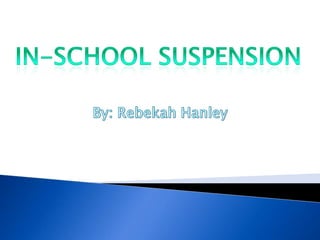
Edu373 iss
- 1. In-school suspension By: Rebekah Hanley
- 2. An alternate form of Out of School Suspension (OSS) where students are kept on school grounds in a secluded area in order to complete class work. Brought on by highly inappropriate behavior. Use of study carrels for focus, silence, and an ISS monitor present at all times. Student cannot be placed in ISS for the same infraction more than once. Range from 1-10 days. What is In-School Suspension?
- 3. All morning, Erik was in an irritable mood. He was slow to follow his fifth grade instructor’s directions. Then during math, Erik used his pen to gouge vulgar words into the top of his desk. The instructor sent Erik with the day’s assignments to ISS. The ISS supervisor reviewed the in-house rules with Erik, then assigned him a desk facing the wall. During lunch break, the instructor contacted Erik’s father and explained that in addition to ISS, Erik would remain after school 30 minutes to repair the damage done to his desk. From ISS Scenario
- 4. Regrettably Erik made a very poor decision by carving vulgar words into his desk. This is only one of the many different ways for a student to receive In-School Suspension. ISS is usually chosen over OSS due to the fact that during OSS there is no one to supervise the student and the student runs the risk of getting into graver trouble while roaming the streets. OSS is resorted to when the offense occurs on more than one occasion.
- 5. Fighting Theft Substance Abuse Wild classroom behavior Vandalism Defiance towards authority figures Truancy/ skipping classes Not used for minor violations When to use ISS
- 6. Alternate forms of punishment fail. Student causing potential harm to self or others (physically, emotionally and mentally). Distractions hindering classmates ability to learn. Severity of actions so extreme normal classroom modes of punishment do not fit the “crime”. Why use ISS?
- 7. Ups and Downs of ISS Positives Negatives Off the streets. Reduces amount of trouble student can get in. Continued engagement in curriculum. In a structured, supervised atmosphere. Counseling. Learning activities magnify students’ actions. Work considered “busy work”. Not all students learn lesson. Used as an escape. Some schools do not provide counseling and leaning activities. Social hindrance.
- 8. Crowe may actually agree with In-School Suspension if the infraction is serious enough. Even though in earlier pages she talks about having students use I-statements to resolve issues, she does state that “serious infractions such as hitting and bullying” should not be handled by the students. These issues should be taken care of by an adult and consequences to follow will align with the school’s discipline policy (Crow, 83). If the offense is serious enough for In-School Suspension that is what the student should receive. Crowe would suggest teaching students behavior management skills and suggest preventive methods so the situation does not escalate to the point where ISS is needed. Compare/Contrast
- 9. According to Larivee, classrooms should not have a management system with strict, unbending rules. This will create submissiveness and will reduce the possible effects that the instructional system may have on the student in terms of “self-regulated learning”. If this is the case then Larivee would object to In-School Suspension because this is one of the most rigid systems possible (i.e. no talking and removal from the instructional setting). In ISS the learning is now up to the child but most learning is fostered through the teacher who provides structure and help when needed (this is where ISS would be lacking). Compare/Contrast
- 10. Reducing Repeat Referrals to In-School Suspension Http://www.youtube.com/watch?v=CXDbY64uxCw This video showcases a great method to try and reduce the amount of In-School Suspension visits. The Ripple Effect (the program in question) is designed to improve student behavior thus helps reduce the number of In-School Suspension cases. Also the program can help discover other potential issues the student is having in the classroom. I think the Ripple Effect program should be experimented with so there are less behavior issues in schools across the nation. With better behavior, a better learning environment can be formed. Check this out…
- 11. Delisio, E.R. (2008). In-School Suspension: A Learning Tool. Education World. Retrieved from http://www.maine.gov/education/speced/gsst/tools/b4se/reports/discipline/in_school_suspension.pdf Southard, M. (n.d.) In-School Suspension. Retrieved from http://www.tandl.leon.k12.fl.us/programme/Suspensions.html In-School Suspension (ISS). Retrieved from http://www.usu.edu/teachall/text/behavior/LRBIpdfs/In-School.pdf Sisco, D.L. (2006). Time-Out and In-School Suspension in the School Setting: A User’s Guide for School Administrators. Retrievedfromhttp://www.mslbd.org/Admin_Conference/Sisco%2010-5-06.pdf Resources